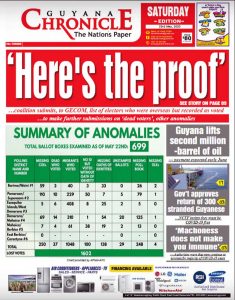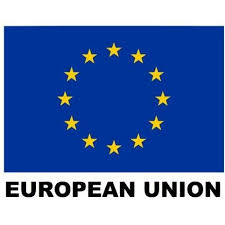State media places ruling party’s views over public interest – EU Observers
“The Government of Guyana is committed to the promotion of a high degree of media professionalism. The administration will not undermine the professionalism of state media workers by subjecting them to political direction or interference in their work.” – President of Guyana, David Granger (GPA Workshop at Regency Suites Hotel – April 29, 2016)
The Electoral Observer Mission of the European Union, in its final report, has found that state media entities are unduly subjected to so much political influence that the ruling party’s views trump the public interest.
“State-owned media which include one TV channel, eleven radio stations, and a daily newspaper historically reflect the views of the ruling party, rather than serving the public interest,” the report states.
This forms part of several findings in the report, compiled using information the mission gathered during its observation of Guyana’s 2020 General and Regional Elections.
The Mission’s findings stand in contrast with a statement made by President David Granger, who had said in 2016 that the Government of Guyana would not undermine the professionalism of state media workers.
In response to concerns that the Government may have been interfering with the work of state media, the President had stated “The Government of Guyana is committed to the promotion of a high degree of media professionalism. The administration will not undermine the professionalism of state media workers by subjecting them to political direction or interference in their work.”
Granger had made this statement in an address during a workshop for journalists at Regency Suites Hotel on April 29, 2016. While the EU Mission made pronouncements on public and private media, it pointed to the need for state media, funded by taxpayer dollars, to be a “genuine public service broadcaster”.
The Mission’s information demonstrates that this is not the case.
“The state-owned broadcast media,” the EU Mission stated, “showed an overt bias in favour of the government and ruling coalition. Namely, the state-owned TV Channel 11 devoted a total of 60 per cent of its news coverage to the government and the president, and 25 per cent to APNU+AFC.
In addition, clearly misusing state resources, the Department of Public Information (DPI), a governmental agency, was extensively used to promote the ruling coalition’s campaign activities. The state-owned newspaper, Guyana Chronicle, devoted 83 per cent of its news coverage to the incumbent president, government and ruling coalition and at the same time offered considerable space to letters from readers critical towards PPP/C.”
The Mission’s findings appear to align with a finding of the United States Department of Justice in its ‘Guyana 2019 Human Rights Report’. The US Bureau of Democracy, Human Rights and Labour considered it to be a form of “Censorship and Content Restrictions’ that “A 2015 directive from the prime minister determines that all headlines in state-owned print media be approved by the Office of the Prime Minister before publication.”
Unequal coverage by NCN
Notable in the case of the National Communications Network (NCN) is the fact that the state broadcaster’s Facebook live coverage of the campaign launches of the two major parties was unequal. Kaieteur News reported in January that NCN live streamed more than an hour of the Coalition’s campaign launch, which took place D’Urban Park.
However, when the People’s Progressive Party Civic (PPP/C) launched its campaign, NCN only awarded a minute and a half of their Facebook live stream. Kaieteur News had reached out to the Chairman of NCN, Enrico Woolford, who said that the broadcaster is responsible for its radio and television frequencies – and not a telecommunication platform like a Facebook live stream. Woolford had pointed to the Broadcasting Act of Guyana, explaining that he is concerned about whether NCN’s broadcasts are balanced on the frequencies allocated to NCN.
In addition, he said that since the Parliament had already been dissolved at the time, that “one has to consider whether it is still as newsworthy as it ought to be, because [the PPP/C as Opposition] derive their power from there.”
Examples of political misinformation in state media
During this election season, state media, particularly the Department of Public Information (DPI) and Guyana Chronicle have been used to exemplify the views and claims of the governing coalition, A Partnership for National Unity + Alliance for Change. In some cases, this has amounted to misinformation and false reports. Here are two examples.
DPI
On May 22, 2020, DPI published an article titled ‘Unstamped ballots evidence of electoral fraud– Aubrey Norton’. In this report, the publication carried a statement, made by PNCR executive, Aubrey Norton, who had claimed that “We are seeing that wherever there is intermixing with the joint services votes, large amounts of ballots have not been stamped.”

This report was part of misinformation from the coalition, in which it claimed that the disciplined services’ ballots were not stamped, and that they were consequently disenfranchised.
In its report on a “mounting number of irregularities” as claimed by Norton, DPI stated “These include the more than 8,000 unstamped ballots of the disciplined forces.”
A simple check found these statements to be false. Kaieteur News had managed to debunk the false statements made by Norton and propagated by DPI, on June 1 and subsequently released the report on June 2 – 11 days after Norton made the statement. This newspaper reported GECOM’s Public Relations Officer Yolanda Ward, following Norton’s claim, stating that only 1,536 ballots had been rejected as of June 1 in the National Recount. The claim was that over 8,000 disciplined services ballots were unstamped, even though all the ballot boxes were not yet opened. There was no way as of that date that it could have been known that over 8,000 disciplined services ballots were unstamped.
Even then, when the National Recount ended, GECOM’s General Election tabulation showed that only 4,211 ballots were rejected. The unstamped total is not even that high, as ballots may be rejected for other reasons than lack of stamp.
Up to press time last night, the false claim about disciplined services ballots was still on DPI’s website.
Guyana Chronicle
Another example of misinformation can be found on the lead story carried by Guyana Chronicle on May 23, 2020, headlined ‘Here’s the proof’.
The report, according to the state newspaper, came one day after the GECOM Chairperson, Justice (ret’d) Claudette Singh stated in a GECOM press release that “He who asserts, must prove.”
The Chair had said this, after the coalition accumulated a series of claims of electoral fraud. Despite calls by members of the media for proof, coalition representatives would only say that the proof would come, eventually.
The Guyana Chronicle lead story was about a submission made to Justice Singh, by the General Secretary of APNU, Joseph Harmon, after she asked him to provide evidence of the allegations.

The Chair’s correspondence, quoted by Guyana Chronicle, states “I wish to request for your Party to formally submit evidence in relation to the objections, particularly as they relate to deaths and migration. The submission of evidence would inform the deliberations at the level of the Commission.”
While the headline of the story would have the reader believe that ‘proof’ was submitted, the reader would realize after reading the story, that no proof was submitted at all.
What was submitted was, in fact, only a list of names, with no evidence. Justice Singh, then, realizing that a list of names did not prove anything, subsequently wrote to Police Commissioner Leslie James, asking for the Immigration Department to assist GECOM in determining whether the claims were true.
Recommendations
The EU Observer Mission pointed to the need for state media to be editorially independent, and said that there should be certain legal and regulatory reforms.
“The chairpersons and board members of state-owned media are directly appointed by the prime minister, who holds the portfolio of the Ministry of Information, and there is no specific legislation regulating the selection process of the board members and state-owned media funding,” it states.
To this, the Mission said that that there should be an open and competitive selection process of its board members.
It added “Introduce a legal and regulatory system that transforms the state-owned media into a genuine public service broadcaster.
In addition to the goal of granting state media “editorial independence”, the Mission said that state media should have financial autonomy and clear separation from any government institution.
Guyana’s Media Environment
The EU Observer Mission pronounced that voters were generally exposed to politically influenced media all around, which impaired their ability to make an informed choice on a party.
The leading paragraph states “Largely biased state media, highly partisan private media, extensive use of paid promotional content, absence of political debates, and a lack of oversight by the regulatory body negatively affected voters’ ability to make an informed choice.”
The Observer Mission illustrated, using statistics gathered by its team, how political influence affected the coverage of certain public and private media outlets.
“The media environment is highly politicized,” it states, “with very few independent media and the majority of media outlets being either directly affiliated or leaning to one of the two main political camps.”
However, it notes that Stabroek News and Kaieteur News “proved to be rather balance in their news coverage,” and that News Room Guyana proved to be a valuable live, online source of information.
Kaieteur News forwarded questions to the President’s Director of Public Information and Press Service Unit on WhatsApp late yesterday. This newspaper sought to determine whether the President’s commitment as expressed in April 2016 had changed, and whether he considers the EU Observer Mission’s findings to be an accurate judgment of the role of the Government in the work of state media. However, up to press time, Kaieteur News did not receive a response.






















